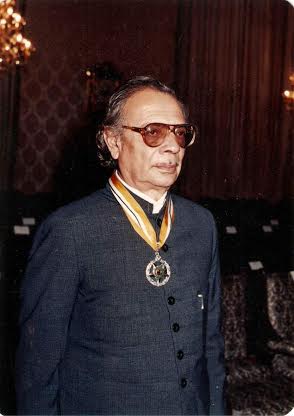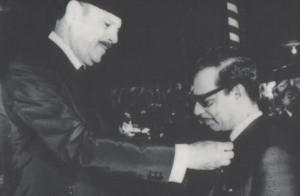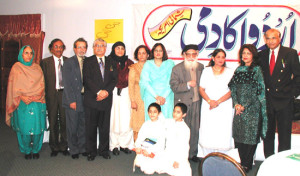Shanul Haq Haqqee was a distinguished Urdu poet, writer, journalist, broadcaster, translator, critic, researcher, linguist and lexicographer of Pakistan. The esteemed literary career of Dr. Shan-ul-Haq Haqqee began in pre-partition Delhi, reached prominence in Pakistan, and to this day is greatly celebrated. He was born in 1917 in Dehli and obtained his BA from Aligarh Muslim University, India. He received a Master’s in English literature from St. Stephen’s College, Delhi where he recited his first ghazal at an annual poetic gathering at St. Stephen’s College. He belonged to a prominent literary family from Delhi and literature had been infused into his life from a very early age. His father, Maulvi Ehtashamuddin Haqqee, wrote several short stories such as A Study of Hafez, Tarjuman-ul-Ghaib, and a translation of Diwan-i-Hafiz in verse amongst others.
Shanul Haq Haqqee authored more than 25 books in various genres, which popularised him as a commended poet, short-story writer, journalist, prose and poetry writer for children, critic, translator, lexicographer, linguistic scholar, and an all rounded literary phenomena. Celebrities such as Naheed Akhtar rose to eminence decades ago when she sang a ghazal written by Shanu Haq Haqqee titled “Tum say ulfat kay taqazay na nibha’ey jaatay”. Shanul Haq Haqqee received the Sitara-e-Imtiaz, Tamgha-e-Quaid-i-Azam and won awards from PTV after working there as the Head of the sales department for PTV and conceptualised the advertisement of State Life Insurance in 1979 while working as Creative Director for United Advertisers which was an enormous success. His other works include his famous poems, Tar-i-Pairahan (1957) and Harf-i-Dilras (1979), and a soon after collection of his selected ghazals was published under the title, Dil ki Zaban. His other publications include short stories, such as Maqalaat-e-Mumtaz, Shaakhsaanay, The Urdu translation of Bhagvad Gita, and children’s literature called Phool Khilay Hain Rung Birnagay. During his career, he also wrote a translation for Jack Shaffer’s novel Shane, but the translated version was called Anjaan Rahi, Khayabaan-e- Pak, which was an omnibus of Pakistan’s folk poetry representing several accomplished poets, and he also authored his own autobiography. He also translated the Shakespeare’s Antony and Cleopatra, and Chanakya Kautilya’s Arthashastra and also compiled two dictionaries.
Shanul Haq Haqqee was also associated with the Urdu Dictionary Board for 17 years from 1958 to 1975 for which he had great affection as he had invested a lot of hard work into assembling a monumental 24-volume dictionary, which is often coined as his labor of love. His work on The Oxford English-Urdu Dictionary is a phenomenal vocation that instantly became a necessity for every scholar and student of the Urdu language, and is a translation of the eighth & ninth editions of Concise Oxford English Dictionary and his compilation Farhang-e-Talaffuz is a pronunciation dictionary of Urdu published by the National Language Authority. In addition to the libraries in South Asia, some of Shanul Haq Haqqee’s pieces and books can be found at the Library of Congress and the University of Toronto Library and in abundance anywhere in Pakistan.
Shanul Haq Haqee passed away on 11th Oct 2005 in Toronto, where he had emigrated to provide better opportunities for his children, at the age of 87 years, where he resided with his five sons and 1 daughter and was continually working on various pieces in his dearly loved national language. He was unfortunately diagnosed with lung cancer and left his last work Urdu to Urdu dictionary incomplete due to his passing away, which he was preparing for Oxford University Press.
After his death, several tributes were presented in the honour of Shanul Haq Haqqee in Pakistan, London and Toronto. Dawn newspaper reported that the vice chancellor of the University of Karachi, Dr Pirzada Qasim Raza, issued a press testimonial in which he said that Mr. Haqqee was gifted with several qualities. He stated that “he was a multi-dimensional personality and he brought his energies to bear upon many fields of learning. His literary works will always be remembered by scholars and students. His death is a great blow which comes on the heels of Dr Ghulam Mustafa Khan’s death.” The head of the Muttahida Quami Movement expressed grief over the death of Mr. Haqqee, and expressed that Mr. Haqqee will be long remembered for his service to the numerous fields of Urdu literature and linguistics. In another such tribute, his youngest son narrates a short conversation with his father during his last days, in which he stated that “I asked my father if he ever thought of leading a luxurious lifestyle or if he regretted not accumulating wealth during his life, to which he always replied “Hum Pakistan ki khidmet kerne aaye the, jaaidaad banane nahee” which translates to “we came to serve Pakistan, not to accumulate inheritance.”
An article by The Friday Times relates that Iftikhar Arif, Ex-Chairman Academy of Letters and National Language Authority and himself a poet and scholar and a close acquaintance of Mr. Haqqee’s, reminisces with admiration and fondness for the Shanul Haq Haqqee and says that “He was such a hard working man and gained equal recognition for poetry and translation of various literary works. The most distinguished work in translation for the Urdu language was done by Haqqee sahib.” With his relentless contributions in poetry and prose Shan-ul-Haq Haqqee has indeed found his place in Urdu literature pantheon. He was a fiercely nationalistic man who worked relentlessly in popularizing his mother language and was appreciated not only in Pakistan but across the globe for his accomplishments and his astounding work towards the Urdu Language. Hi poems, stories and translations are a legend in themselves, and a vital part of the literary history of the sub-continent and have received several tributes since his parting.







